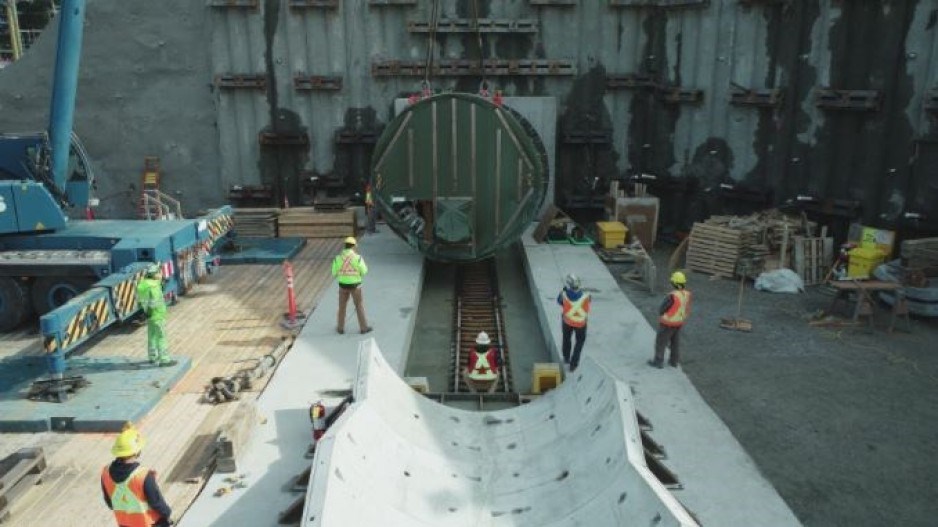The federal government will end up having to write off $17 billion in debt for the Trans Mountain pipeline expansion, thanks to a massive increase in its capital budget and toll rates that won't cover those added costs, according to an analysis by independent economist Robyn Allan on behalf of West Coast Environmental Law.
The federal Ministry of Finance refutes Allan's conclusions.
Allan, a former CEO of ICBC, has argued against the pipeline’s expansion since the outset, and has been intervenor speaking against it and the Northern Gateway project during National Energy Board hearings.
She has written a number economic analysis that challenge the need for the expansion, as well as its financial viability.
In her latest analysis for West Coast Environmental Law, Allan concludes that the toll rates shippers will pay will not cover the cost of the expansion, the price of which has ballooned.
The expansion project involves twinning the pipeline that runs from Alberta to Burnaby. The estimated cost of the project has increased several times since it was first proposed.
In 2018, prior to Kinder Morgan (NYSE:KMI) announcing plans to abandon the project, the expansion was estimated to cost $7.4 billion.
Kinder Morgan's threat to halt the project was prompted by the John Horgan government’s legal challenges, which were aimed at halting the project. Kinder Morgan said it “cannot resolve differences between governments” – meaning the federal and B.C. governments, which were at odds over the project.
After Kinder Morgan announced in 2018 that it would halt funding the expansion, which was in the early stages, the Trudeau government stepped in, bought the existing pipeline for $4.5 billion, and assumed responsibility for finishing what Kinder Morgan had just started.
After the federal government assumed responsibility for the project, the capital budget increased from $7.4 billion to $12.6 billion.
More recently, in February this year, the Trans Mountain Corporation announced the estimated cost of finishing the project is now $21.6 billion. The company said the pandemic and flooding in November 2021 -- both of which caused major delays -- accounted for $1.4 billion in added capital costs.
The Trudeau government insisted it would not bail out the project with public funds, although it has provided federal loan guarantees. The federal Ministry of Finance says it is sticking to that promise.
“In February, the federal government announced that no additional public money will be spent on the project and Trans Mountain Corporation would secure the funding necessary to complete the project with third-party financing,” Caroline Thériault, media spokesperson for the ministry, said in an email to BIV News.
“The government engaged both BMO Capital Markets and TD Securities to provide advice on financial aspects of the project. They confirmed that, despite the increased cost estimate and completion timeline, the project remains commercially viable.”
But Allan contends the toll agreements Trans Mountain has with shippers won’t cover the overruns in cost, and that the federal government will therefore have to forgive $17 billion in debt.
“While Trans Mountain’s capital cost has increased to $21.4 billion, the tolls shippers will pay have not kept pace,” Allan says in a West Coast Environmental Law press release.
“When the entirety of Trans Mountain’s debt commitments is considered along with the revenue constraints written into the long-term contracts with oil product shippers, we find the $17 billion in debt owed to Canadians cannot be repaid.”
In her analysis, Allan says Trans Mountain’s debt burden has increased from $15.8 billion to $25.8 billion, $15.8 billion of which is currently owed to the federal government. The remaining $10 billion is a government guaranteed one-year revolving bank facility.
Allan says the pipeline is “not profitable and is unable to pay the interest on the debt already owed to Canadians.”
The problem, she says, it that the toll rates that Trans Mountain Corporation charges shippers isn’t enough to cover the debt.
“The contracts Trans Mountain has with its oil product shippers are the source of Trans Mountain’s lack of profitability and commercial viability since the revenue stream determined by the toll methodology is insufficient to cover the cost of financing, debt repayment and all the operating expenses.
“The economically prudent and responsible solution is to cancel Trans Mountain’s expansion unless the beneficiaries – the oil producers who plan to use the pipeline – pay the full cost,” she says in her report.
While the Parliamentary Budget Officer, Yves Giroux, agrees that the TMX project will end up a net loss for the federal government, he also says scrapping the project would mean a $14 billion write-off for the federal government, with nothing to show for it.
“Based on the new developments since the previous report, specifically the increased construction costs and the delay in the in-service date, PBO finds that the government’s 2018 decision to acquire, expand, operate, and eventually divest of the Trans Mountain assets will result in a net loss for the federal government,” Giroux concluded in June.
However, cancelling the project would mean the federal government would have to write off $14 billion in assets.




